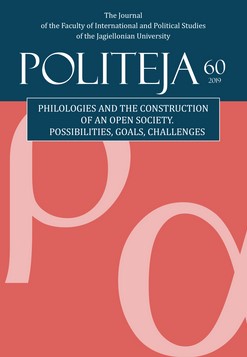Habla el policía. Polifonía novelesca y debate democrático en algunas novelas españolas sobre el franquismo y la Transición
The Policeman Speaks. Novel Polyphony and Democratic Debate in Some Spanish Novels about Francoism and the Transition
Author(s): Nina Pluta Subject(s): Political history, Comparative Study of Literature, Other Language Literature, Government/Political systems, Theory of Literature
Published by: KSIĘGARNIA AKADEMICKA Sp. z o.o.
Keywords: Spanish novel; 20th and 21st century; polyphonic novel; dialogism; historical memory; francoism;
Summary/Abstract: In recent years a new orientation in the Spanish political memory (a shift from the tendency towards forgetting conflicts to the claims for recognition for all victims) can also be noticed in a significant number of literary works. Many novels offer a broad coverage of social discourses and engage in the process of negotiations over a critical period in the 20th century history of Spain, namely the “Transition” from the late francoism era to democracy. This paper analyses fragments of three contemporary novels (La caída de Madrid by Rafael Chirbes, El vano ayer by Isaac Rosa, and El día de mañana by Ignacio Martínez de Pisón) whose authors give voice to an ambiguous character -- a policeman from the Francoist period. He makes attempts to justify his work and his support for the regime. These fictional utterances are studied from the perspective of certain theories of literary dialogism and literary poliphonic devices. The final question is whether it is reasonable to expect any social impact of such literary representations of “democratic” dialogues.
Journal: Politeja - Pismo Wydziału Studiów Międzynarodowych i Politycznych Uniwersytetu Jagiellońskiego
- Issue Year: 16/2019
- Issue No: 60
- Page Range: 115-138
- Page Count: 24
- Language: Spanish

